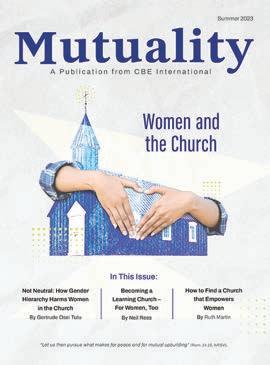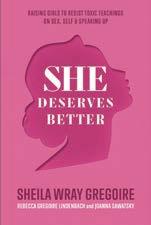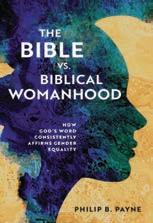


Not Neutral: How Gender Hierarchy Harms Women in the Church
By Gertrude Osei Tutu







Not Neutral: How Gender Hierarchy Harms Women in the Church
By Gertrude Osei Tutu



Becoming a Learning Church –For Women, Too

How to Find a Church that Empowers Women

By Neil Rees
By Ruth Martin
“Let us then pursue what makes for peace and for mutual upbuilding” (Rom. 14:19, NRSV)

4 8 12 16 22
Becoming a Learning Church – For Women, Too
The church is a place for all members of the body to grow in their gifts and callings, but this requires deliberate steps to address gender imbalance and make the church a safe place of growth for both women and men.
By Neil Rees
Advocating for Women's Equality in your Complementarian Church
Small changes can build up over time to create an environment that advocates for women’s equality within the church.
By Ariel Stephens
Not Neutral: How Gender Hierarchy Harms Women in the Church
Research shows that gender hierarchy within the church is harmful both to its members and to the local community.
By Gertrude Osei Tutu
Shaped: What Survivor’s Journeys Can Teach Us About Leading With Resilience, Courage And Truth
Recognizing and naming truth can be painful but the road it takes us down can create exactly the kind of advocates the church needs.
By Claire Roster
Finding a new church home can be a challenging process; how can you determine whether a church will support and empower women? These tips and suggestions will help guide you in your search.
By Ruth Martin
Mutuality is published quarterly by CBE International, 122 W Franklin Ave, Suite 218, Minneapolis, MN 55404-2451.
We welcome your comments, article submissions, and advertisements. Visit cbe.today/mutuality
All Scripture quotations, unless otherwise indicated, are taken from the 2011 revision of the Holy Bible, New International Version ®, NIV®. Copyright © 1973, 1978, 1984, 2011 by Biblica, Inc.™ Used by permission. All rights reserved worldwide.
Advertising in Mutuality does not imply organizational endorsement. Please note that neither CBE International, nor the editor, nor the editorial team is responsible or legally liable for any content or any statements made by any author, but the legal responsibility is solely that author’s once an article appears in Mutuality
CBE grants permission for any original article (not a reprint) to be photocopied for local use provided no more than 1,000 copies are made, they are distributed free, the author is acknowledged, and CBE is recognized as the source.
Disclaimer: Final selection of all material published by CBE International in Mutuality is entirely up to the discretion of the publisher and editor. Please note that each author is solely and legally responsible for the content and the accuracy of facts, citations, references, and quotations rendered and properly attributed in the article appearing under his or her name. Neither CBE, nor the editor, nor the editorial team is responsible or legally liable for any statements made by any author, but the legal responsibility is solely that author's once an article appears in print in Mutuality


too bad you’re a woman.”
Editor: Carrie Silveira
Graphic Designer: Margaret Lawrence
Publisher/President: Mimi Haddad
Mutuality vol. 30 no.2, Summer 2023
Cover design by Margaret Lawrence Mutuality (ISSN: 1533-2470) offers articles from diverse writers who share egalitarian theology and explore its intersection with everyday life.

From the Editor by Carrie Silveira
“It’s too bad you’re a woman.”

I grew up in a missionary family. This meant that every few years we would return to the United States to give a report to supporting churches. My parents would describe their work in the mission field, their successes, challenges, and prayer requests. One Sunday after the church service, my mother, having given a rousing presentation on our missionary work, was approached by an older gentleman. He vigorously shook her hand, thanking her for her talk. “You’re an excellent speaker— too bad you’re a woman, you’d make a fine preacher.” He nodded and walked away, leaving her in stunned silence.
The missionary field has historically been an area strongly led by women like Lottie Moon and Amy Carmichael who would ironically be prohibited from serving in that same capacity in their home churches and countries. Lines are drawn and distinctions made to separate preaching to a church congregation on a Sunday morning from evangelism done on the mission field. Should a woman be invited to speak on a Sunday morning, the language around her changes; she’s not preaching a sermon, she’s giving a “talk” or “leading a presentation,” regardless of how sermon-like it is. This may seem insignificant, but it is part of a larger culture that deemphasizes women and their gifts because of their gender. By treating women and their contributions as less authoritative, churches stifle gifted Christians and misrepresent Scripture. What harm are they causing to these women by not providing a place for them to flourish in the full extent of their calling? What harm are they causing to the congregation by not allowing them to learn from women in a meaningful way?
Churches who bar women from serving in their leadership face another difficulty: without female representation, women’s issues and needs often fall to the wayside. Unique opportunities to serve the women of the congregation or local community are easily missed because they are not on men’s radars. Worse still are situations in which women who are victims of abuse find themselves unable to seek help from among the leadership because there are no women there to hear them. In environments where women feel unsafe, particularly unsafe with men, how can they seek help from entirely male church leadership? While there are godly men in leadership positions who would readily help, many women who have experienced abuse fear they would not be believed. Indeed, we have seen many cases in which men in leadership deny support to those who seek it. What problems are created when there is not diversity among the leadership to keep things in check?
Paul tells us in 1 Corinthians 12,
“We were all baptized by one Spirit so as to form one body—whether Jews or Gentiles, slave or free—and we
were all given the one spirit to drink.13 Even so the body is not made up of one part, but of many.14 […] If the whole body were an eye, where would the sense of hearing be?17 […] The eye cannot say to the hand, “I don’t need you!” And the head cannot say to the feet, “I don’t need you!”21 […] Now you are the body of Christ, and each one of you is part of it.” (1 Cor. 12:13 – 14, 17a, 21, 27)
There is no hierarchy among the spiritual gifts distributed by the Holy Spirit to women and men alike, just as there can be no gender-based hierarchy between the women and men in the church who receive them. A healthy church needs all of its parts working together. When people are prevented from serving according to their gifts and calling, the whole church suffers.
In our last issue, we examined questions related to women in the home: who makes decisions, the division of household labor, and what Paul intended in his writings on marriage. Now we turn to the church.
We start with Neil Rees and his call for churches to more fully support the women in their congregations, providing a safe place for them to learn and grow.
Not everyone is able or even called to leave their complementarian church, and egalitarian churches often do not spring up from nothing but are the result of a long process of growth and study. In her article, Ariel Stephens shares ways that we can begin to effect change where we are.
Then we turn to Gertrude Osei Tutu who powerfully answers the question, “What is the big deal, anyway?” demonstrating that a church’s position on women is not neutral and has important implications for both the church and the local community.
As numerous investigations make clear, it is not a given that the church is a safe place for women. Claire Roster walks us through her personal story of abuse and recognizing the truths which came to shape her into a strong advocate for women despite obstacles from church leadership.
Next, Ruth Martin provides a helpful and insightful guide on how to identify churches that value women and empower them to the full extent of their callings. Finally, Mimi Haddad shows how women were created to be genuine partners with men, both in church and beyond.
I hope this issue helps you to reflect on your relationship to the church and the ways in which we can support all members of the body. With that, I hope you feel encouraged to grow in your gifts and follow your calling— even (and especially) if you're a woman.








Ricardo stopped me by the door of the small shop unit where we held church meetings. “Have you ever been invited to someone’s house for a meal,” he started—and I could tell by his manner that this was not headed anywhere positive—“and they sit you down, put a bowl of tepid water in front of you, give it a couple of quick stirs, then take it away again—and that’s it, the whole meal?” “No, I don’t think I have,” I replied. “Why do you ask?” “Well, that’s how I felt in church today,” he retorted. “I came here to be fed from the word of God, only to hear a babbling brook, empty thoughts, nothing more than a shell of a message, and be sent home starving.”




By Neil Rees


Ouch! His words hurt, but not because I was the one who had preached that morning. I hadn’t. Instead, I’d asked a young woman called Magda to speak, and she had genuinely done really well. It’s possible that Ricardo's uncharitable outlook reflected his own misogynistic theology, not the quality of her message, which would have put many more experienced speakers to shame. I desperately hoped that she hadn’t overheard his harsh words.
This was only the second or third time that Magda had stood at the front of the church, with genuine fear and trembling, to bring God’s word to us. A young


believer with clear leadership and speaking gifts, she needed encouragement, training, and opportunity, not dismissive comments designed to squash her back into the pews. I was deeply saddened that Ricardo’s prejudice made him unable to hear what God might want to say through the voice of a woman, much less encourage Magda in her budding ministry.
In addition to his rejection of women as Bible teachers, Ricardo had also completely missed the point of what it means to be a learning church. We are all disciples—learners—which essentially means one thing: we’re not as good at stuff today as we will be tomorrow. The church ought to be a place where people can develop their gifts in safety, confident that others are cheering them on, not looking for the inevitable mistakes or not-as-good-as-it-could-be moments to criticise or disqualify them.


We need to know that we’re on the same side, wanting to “spur one another on toward love and good deeds” (Heb. 10:24). Our priority should be “encouraging one another,” particularly those keen but inexperienced novices taking early steps in ministry (Heb. 10:25). After all, it takes a whole lot of courage to make yourself vulnerable and take risks when you know full well— objectively at least—that you won’t do as good a job as someone else who’s been doing it for years.

Learning is not just for the men, though, as even the most patriarchal interpreter of Paul’s frequently quoted words would have to admit (see 1 Timothy 2:11)! We want our churches to be places that reflect the universal truth of Galatians 3:28, where all , both female and male, can learn, grow, and use their God-given gifts equally. Yet the realities of past prejudice, discriminatory dogma, and maledominated hierarchies in churches have created anything but a level playing field. Significant barriers need to be addressed for women to be able to learn and grow in ministry with the same freedom as their male colleagues. This requires courageous action on the part of leaders, whether female or male.

Historically, our cultures—both secular and church— have empowered men and relegated women to lower status at every level. Male privilege has become normalised and thus hides in plain sight. Under its influence, boys happily put themselves forward for anything and everything, while girls can be labelled as pushy when attempting to do the same. Centuries of tradition create similar environments in churches in which men happily gravitate towards roles of influence and authority—and are welcomed— whereas women tend to be more reticent. And then,


Historically, our cultures—both secular and church—have empowered men and relegated women to lower status at every level.


. . . the majority of girls in the church grow up without healthy role models that encourage them to think of themselves as potential church leaders, speakers, or pastors.
even when they do pluck up courage or determine not to be bound by unwritten rules, women often find they have to fight for acceptance.
This unequal starting point needs to be understood. Rather than waiting for women to take the initiative, leaders must carefully consider the potential in those they lead and proactively encourage women in exploring roles of authority or teaching ministries. To build genuine confidence, the understandable insecurities felt by many women should not be ignored but met with the offer of appropriate training and other learning opportunities. A longterm approach that includes mentoring, preferably by women with their own experience in Christian ministry, will bring better results than attempts to simply catapult women into high-profile roles without adequate preparation. It is a process, and every step of progress along the way should be recognised and celebrated.
Across the world of business, it is widely acknowledged that companies are adversely affected by the low numbers of women represented on corporate boards.1 So, governments in Europe have taken action, setting targets or quotas to encourage or mandate increased percentages of women at the highest levels of management. 2 This type of “positive discrimination” is often the only way to redress historic imbalances
and create a different organisational culture. The church is no different, and major change does not “just happen.” To restore balance in women’s participation in leadership and ministry, deliberate goals need to be set, pursued, and fought for.
One of the keys to success in most areas of life is found in having suitable role models. With the historic female to male imbalance in church leadership and ministry, it is a sad fact that the majority of girls in the church grow up without healthy role models that encourage them to think of themselves as potential church leaders, speakers, or pastors. If we do things right today and create suitable environments for women to grow in leadership and ministry responsibilities, we can trust that future generations of girls will have these role models. That does not solve the issue for us now, though. When a church does not have enough female leaders of its own to nurture and lift up its young women into leadership, it’s time to access outside resources. We invite missionaries to come and motivate people towards mission—in the same way, could we not consider inviting women in ministry to share their experiences and inspire other women to dream big dreams? Why not ensure that a significant majority of visiting speakers are women? The radical changes that we want to see require such bold actions.
In seeking suitable women role models, however, there is another danger to avoid. Women must not have to learn to “behave like men” to qualify for leadership or ministry positions. We believe in the biblical equality of women and men, not their uniformity. The church needs women to be free to bring their full selves to their God-given callings, and this demands a reset of church members’ expectations around leadership. If we think a female leader must essentially be a man in a woman’s body, then we have seriously missed the point. The church will be a much healthier place when women and men are permitted to lead according to their gifts and calling, without being constrained by stereotypes.
For practical steps like this to be successful, it is essential that the whole church be on board with what is being done and understand what will be required and why. Vague talk about wanting


women to have more opportunities in ministry is insufficient if a church is to correct the long-standing subordination of women to men and its associated misrepresentation of Scripture and God’s purposes. The reality of the imbalance of women and men needs to be communicated clearly, and it must be equally clearly labelled as unacceptable. As in other areas of ministry strategy—such as starting a new work in another neighbourhood or putting together a discipleship programme—churches should set out and agree upon their goals and the steps planned to achieve them.
One final word. Like Moses before her, for several decades Deborah embodied the roles of prophet, leader, and military commander—not to mention— singer! She did all this as a married woman and refers to herself as a "mother in Israel" (Judg. 5:7). Many women will, at some time in their lives, become mothers. Cultural roles and expectations about motherhood can vary considerably, but if we want women to take their rightful place in church leadership and ministry, being a mother must not be an obstacle. This does not mean simply providing a nursery so that mothers are released from childcare as soon as possible. Though there are occasions where such provision is appropriate, it should not be the only option. Another approach would be to normalise the role and responsibility of fathers in caring for children and supporting their wives in ministry. It may also involve getting used to having babies and small children around, creating spaces and scheduling breaks for breastfeeding, and de-emphasizing the sharp division between family and ministry that many churches traditionally create. Our claims of being "family-friendly" must translate into practical action and ensure that mothers—whatever their role or gifts—can continue to participate in all aspects of church life, even while caring for their children deserves special attention.
In speaking about church leaders, Paul hints at the benefits of parenting experience, stating: “If anyone does not know how to manage his own family, how can he take care of God’s church?” (1 Tim. 3:5). Compared with their male counterparts, the time that women often dedicate to motherhood may mean that fewer complete a DMin or other forms of formal training or experience, but that must never become an excuse for suggesting they are less suitable for church leadership and ministry. When combined with appropriate pathways for personal development, the unique experience of motherhood is an asset that should be valued as part of the process by which some women are moulded for leadership responsibility.
Women are every bit as capable of leadership in church as men, and equally gifted by God for this. Now it’s up to us to lay down practical pathways to make this a reality for them.
Women are every bit as capable of leadership in church as men.
In addition, we should recognize that experience acquired through parenthood can be a positive factor that enriches and brings depth to a person’s ministry.

Neil Rees and his wife, Lynn, following ten years in the UK leading their sending church, have just returned to ministry in Spain, where they previously lived for twenty-seven years. This included eight years when Neil was international director of their mission agency, World Horizons.
1. See, for example, Credit Suisse, “Large-cap companies with at least one woman on the board have outperformed their peer group with no women on the-board by 26% over the last six years, according to a report by Credit Suisse Research Institute,” Press Release, July 31, 2012, https://www.credit-suisse.com/about-us-news/en/articles/media-releases/42035-201207.html, or Claire Braund, “Why Women Are Good for Business,” Women on Boards, December 2011, https://www.womenonboards.net/en-au/reference-items/career-and-leadership/why-arewomen-good-for-business.
2. See "EU action to promote gender balance in decision-making," European Commission, accessed March 31 2023, https://commission. europa.eu/strategy-and-policy/policies/justice-and-fundamental-rights/gender-equality/equality-between-women-and-men-decisionmaking/eu-action-promote-gender-balance-decision-making_en.



By Ariel Stephens
As a woman who periodically preaches and teaches in a “soft complementarian” church, one that allows women to teach but not be an elder or be in positions that have authority over the pastoral staff, I’ve often thought about how we can better advocate for women’s acceptance in
all areas of the church, including the positions of pastors and elders. Over the years, as I’ve gravitated towards the idea of mutuality, I’ve implemented ideas about how to continue advocating for women’s equality in a complementarian church.
The notion of “biblical womanhood” is a cultural construct built mainly on a specific interpretation of New Testament texts. In order to combat this notion of “biblical womanhood,” we need to examine history to see what women were doing during the early church. Ask, what were women doing in Scripture? How did their presence, gifts, and talents benefit the church? What did Jesus say and do for women? Women were patrons, house managers, married or single, and financial benefactors. Once we study women in an early church historical context, both from Scripture and historical references, our cultural blinders begin to shift as our ideas about how women contributed to the early church reshape and revitalize our pragmatic approaches in the modern church era.
The Bible doesn’t contradict itself. Studying women across all Scripture helps to gain a broader view of what women were doing throughout Israel’s history. If we see women like Deborah and Hulda teaching and leading in the Hebrew Bible with no negative connotations, how does that translate to women teaching and leading now?
Romans 12:3–8 implies gifting is not gendered. God gives gifts to whomever he wills. However, when the doors are closed to women in certain areas of ministry or when women are limited to specific areas (like women’s ministry, for example), they cannot flourish fully in their gifting and the entire church suffers. Many complementarian or hierarchical churches allow women to only teach other women, if at all. What are men missing when the church prevents women from teaching and leading them?
In order to nurture women’s gifting, whatever it may be, we should create spaces or ministries where women can freely be discipled and discern their gifting by those who are already leading and serving there. When energy and resources are poured into women, the entire church benefits. When people witness women using their gifts, this is when the work of the Holy Spirit can intercede instead of their having to merely rely on theoretical texts to interpret what complementarians think is a universal reality.
Begin having conversations with other women and men to hear their thoughts about women in ministry and spur dialogue.
As I began reading and reflecting more on mutuality, it felt very lonely. I wondered, “Do other women feel this way? Are they curious about women’s roles in the church? How do men feel about women’s leadership?”
Begin having conversations with other women and men to hear their thoughts about women in ministry and spur dialogue. Be sure to listen to objections and convictions with humility and gentleness. Each church member is unique, bringing insights and introspection to the table.
One person’s convictions about mutuality are unlikely to cause a major shift in church governance. However, thoughtful conversations with other members may create waves and lead to action. Having other church members in your corner who can advocate with you dispels the loneliness and increases the chances of reform.
In Numbers 27:1–5, the five daughters of Zelophehad approached Moses, Eleazer, the High Priest, and the other leaders. Tradition held that because Zelophehad had no sons, his land and line would be lost since he had died. They proposed that they should inherit the land instead, and when Moses sought God on the question, God said, they are right, and the land was now theirs. The daughters are even named—all five of them, Mahlah, Noah, Hoglah, Milcah, and Tirzah—which is a big deal in Scripture!
Zelophehad’s daughters were not afraid to approach Moses to save their father’s line and confront what many theologians think is an act of injustice. They did not sit back in silence and accept the status quo by looking for other men to marry. Instead, they spoke up, preserved their father’s line, and continued contributing to their tribe and nation. Thanks to them, instruction was even added to the Torah: that if a man has no sons, the inheritance shall pass to his daughters. The boldness of the five daughters amended the Torah and offered future daughters protection (Num. 27:6-11).
Changing perspectives on gender roles and understanding biblical equality in the church doesn’t happen overnight. While not everyone will feel comfortable meeting with
their leaders to discuss mutuality in the church, it’s absolutely essential. Jesus’ claim to keep the peace may often come with the discomfort of bringing up issues like biblical equality in the church. Church leaders like elders and pastors should be approachable and humble enough to listen to your thoughts and questions. Even if you have questions about how the church operates from a leadership standpoint, they should freely answer your questions. Any closed doors to the discussion are a red flag.
We must keep trying to open the heavy door that’s closed to opportunities for women.
Sadly, many women who wish to preach or teach God’s word may need to exit their complementation churches gracefully. At our local church, women are encouraged to use their gifts in many ways: they are deacons, ministry leaders, and potentially pastors, with the exception of the lead pastor. However, the decision-making ability
lies with the all-male elder board. Women leaders in the church are on the threshold because we’re not just fighting for ourselves, but for the generations that follow. Our daughters and sisters whom God has gifted need a space to use their gifts for the good of the church. We must keep trying to open the heavy door that’s closed to opportunities for women, not as a fight for power, but for a place where women can serve beside their brothers in all areas of service to Christ our Lord.

Ariel Stephens enjoys teaching at her local church and reading theology books. She is a wife of one and a homeschooling mother of four.
By Gertrude Osei Tutu
Many female ministers say they feel like second-class citizens in the kingdom of God. Some women lay leaders say they are underutilized, limited by their gender, underappreciated, and taken for granted.1 Other female pastors note that they become overly self-conscious about their bodies when they’re leading service and when they are among their congregants. 2 Many women venturing into church work are subjected to debilitating intersectional discrimination that often leaves them discouraged.3 I find myself voiceless and helpless in my church. Voiceless because, week after week, sermons are preached that have no regard for me, or any of the problems and prejudices that women face in the church. I can only assume this is because we have next to no representation in leadership
positions. Helpless because of experiences like what happened one day in Sunday school as I
. . . instead of women feeling at home in the church, they are left feeling like tolerated helpers.
was teaching: The head of the Sunday school teachers held his hand up to my face to silence me like a child in front of the students and my peers, just to make an announcement. Though the other teachers witnessed it,
nobody spoke up for me, and no one seemed to think that I had been wronged.
Experiences like this demonstrate that hierarchy within the church is not a neutral or secondary issue. Hierarchy within the church actively harms both women and men. Not only does it stop women from following their God-given calling, but it arguably contributes towards women leaving the church altogether.
While statistics show that there are consistently more women than men in the church, only 20.7 percent of clergy were reported to be women as of 2016.4 This percentage decreases further up the ranks in the many churches that default to a “moderate”
* Sources: Data from A. Earls (2017); R. P. Burge (2022).
position regarding the ordination of women: that is, they allow it, but limited to certain positions within the church.5 This reality, in the face of greater feminist advances in secular institutions, coupled with the discrimination against women in the church, is part of the reason regular church attendance of women dropped significantly from 36 percent in 1972 to 28 percent in 2012 in the US, while regular attendance of men fell from 26 percent to a mere 22 percent.6 The percentage of religiously affiliated women has
also decreased from 37 percent to 33 percent, whereas that of men has fluctuated but remains consistent over time.7 This trend is expected to worsen based on a recent survey of millennials and Generation Z. This survey showed that of people born after 1999, women are more likely to be atheist or agnostic (“nones” in the survey). For those ages 18 to 25, 49 percent of women self-identified as “nones”, while 46 percent of men were “nones”. This is a significant dissonance from the data of older generations: of those
born around 1950, just 20 percent of women thought of themselves as atheist or agnostic, compared to 25 percent of men born in that same period.8
This change is not surprising because instead of women feeling at home in the church, they are left feeling like tolerated helpers. The church continues to be a place where the powerful keep the best pastures for themselves and trample down the rest (Ezek.








Gender hierarchy within the church actively harms both women and men . . . it arguably contributes towards women leaving the church altogether.



. . . instead of women feeling at home in the church, they are left feeling like tolerated helpers.
34:18). For many, it is a place where pain, sorrow, and tears continue to dwell (Rev. 21:4). Instead of being heirs, many women feel like second-class citizens. We may have come a long way from the time when the venerated Saint Thomas Aquinas said that “woman is defective and misbegotten,” 9 but with every sneer and roll of the eye when a woman speaks her mind or tries to claim her birthright in Christ, we are taken right back to those dark ages. Aside from overt acts of sexism and misogyny, and the deprivation of certain rights, little things like insensitive comments and unfair expectations are enough to reinforce this kind of demeaning attitude that throughout church history took precedence over weightier issues like biblical truth, justice, and equity. It also reinforces the curse of hierarchy that arose out of sin, instead of recognizing that Jesus takes away the sins of the world (John 1:29).
Jesus raises humanity up to the stature of the fullness of himself, enabling us to sit, not beside, but on his throne with him (Rev. 3:21). In the same way, all members of the body of Christ should strive to build one another up and work to attain biblical equality, not only in our communities, but in the home with our families as well. To begin the process of healing and bringing women back, churches must be intentional in how they treat and equip women. They should create and integrate programs that sponsor women to attend Bible college and seminary to become trained teachers and preachers. This step alone would go a long way toward improving the representation of women at all levels within the church and would provide mentors for younger women. Encouraging education would also ensure that women are less susceptible to believing false information. 10 They should also work toward limiting excessive malecentric anthropomorphism in sermons and teachings. This constant representation of God as a male figure leads to the exclusion of women in the church and
can distance them from God. Instead, the analogies we use to understand God should include women to provide a sense of kinship with God. One example of this is the inclusion of women in Jesus's parables. Beyond changes made in sermons and teaching, deliberate steps should also be taken to integrate women into the structure of the church at every level, from boards of directors to committees that oversee programs, to ensure women have a voice in the church. There are many types of assistance which could be provided for women and others according to each of their needs. The members of a church can contribute through the provision of aid and counseling for people subjected to domestic abuse. They can work to organize discussions to educate the church on the negative consequences of patriarchy so members might work together to battle psychological manifestations of oppression such as internalized oppression 11 and learned helplessness, 12 among others. While the task is large, not every change needs to be; small-scale changes, like the provision of special chairs such as recliners or rockers for new mothers, also go a long way to creating a hospitable environment for this demographic in the church.
To make women feel welcome, the church must change. Even small changes can help transform how a church views women.
Gender hierarchy within the church is not neutral. Discrimination against women and the damaging male domination that accompanies it tear women
To make women feel welcome, the church must change. Even small changes can help to transform how a church views its women.
down and the church apart. We must consciously wage war against these forces in our churches and beyond to fully enjoy the liberation granted us in Jesus Christ, and to no longer be subjected to the heavy yoke of sexism (Gal. 5:1).

Gertrude Osei Tutu is a teaching assistant at KNUST, Ghana. She is an avid supporter of evangelical feminism and is committed to promoting biblical mutuality.
1. M. B. Linguli, “Women, Empowerment and Societal Transformation: The Voice of Women in Pastoral Ministry and Church Leadership of the Methodist Church in Kenya” (Thesis, VID Specialized University, 2017), 43.
2. K. Steeves, “The Lived Experiences of Women in Ministry,” (PhD Diss., McMaster University, 2017), 26, 106-144.
3. W. C. Foster, "Born to Serve: Christian Attitudes Towards Women Pastors" (Thesis), Wichita State University (May 2018), 24-27.
4. A. Oakes, “Amid Growth in Leadership, One-Fifth of U.S. Clergy are Female,” Watauga Democrat, March 1, 2020, https://www. wataugademocrat.com/community/amid-growth-in-leadership-one-fifth-of-u-s-clergy-are-female/article_739b14a1-212a-5d06-b4294d888a369255.html#:~:text=Campbell%2DReed%27s%20report%2C%20which%20examined,%2C”%20wrote%20Campbell%2DReed.
5. S. J. Grenz and D. M. Kjesbo, Women in the Church: A Biblical Theology of Women in Ministry (Westmont: InterVarsity Press, 1995), 33.
6. K. Gaddini, “A Large Number of Single Women are Leaving the Church. Why?,” RELEVANT, January 10, 2023, https://relevantmagazine. com/faith/church/why-are-so-many-single-women-are-leaving-the-church/.
7. A. Earls, “Church Attendance Gender Gap Shrinks, But It’s Not All Good News,” Lifeway Research, September 5, 2017, https://research. lifeway.com/2017/09/25/church-attendance-gender-gap-shrinks-but-its-not-all-good-news/#:~:text=In%20recent%20years%20the%20 gap,of%20General%20Social%20Survey%20data.
8. R. P. Burge, “‘With Gen Z, Women Are No Longer More Religious Than Men,” Christianity Today, July 26, 2022, https://www. christianitytoday.com/news/2022/july/young-women-not-more-religious-than-men-gender-gap-gen-z.html.
9. Thomas Aquinas, “Question 92. The Production of the Woman,” New Advent, http://www.newadvent.org/summa/1092.htm.
10. M.-I. Pop and I. Ene, 2019, “Influence of the Educational Level on the Spreading of Fake News Regarding the Energy Field in the Online Environment,” presented at 13th International Conference on Business Excellence 2019, doi: 10.2478/picbe-2019-0097.
11. E. J. R. David, Internalized Oppression: The Psychology of Marginalized Groups (New York: Springer Publishing Company, 2013).
12. M. E. P. Seligman, “Learned Helplessness,” Annu. Rev. Med. vol. 23, no. 1, (1972): 407-412, 972.

What makes a translation "accurate"? How do you convey concepts that don't translate directly from one language to another? What role does grammatical gender play in understanding gendered concepts? And most importantly, how can Bible translators avoid allowing their unconscious biases to influence their translations? CBE's newest eLearning course, Beyond Bias, will examine these issues and more, exposing how translation teams and commentators can introduce—or avoid—systematic gender bias in their treatment of key passages in Scripture.












































By Claire Roster
Some of the people best placed to help churches to be more intentional about advocating for the biblical equality of women and men are those who have wrestled in the real world with their traditional beliefs and ultimately embraced the principles of biblical equality. What can their journeys teach us about the barriers and facilitators to fostering advocacy? What insights and skills can they offer the church as leaders and advocates for biblical equality?
Change is hard for most if not all of us. We tend to default to the familiar, to what is comfortable, to what is known. It’s never easy to re-examine beliefs that we grew up with, beliefs we learned from our parents, and which many of us then passed on to our own children. It can be difficult to acknowledge that some of those beliefs may have been naive, culturally biased, or maybe even harmful. There is much to learn from women whose spiritual and personal journeys have led them to re-examine their beliefs about the submission of women and the authority of men, and who have come to recognize their God-given worth and agency as equal members of God’s kingdom. For some women, the catalyst of change was their experience as survivors of abuse.

Survivors frequently report that hierarchical teaching within the church emphasizing the authority of men and the submission of women fuelled the abuse they endured, giving their abuser ‘permission’ to continue their abusive behaviour unchecked. Whether they have chosen to leave or to stay in a complementarian church community (and some do), these women have something to say to us on the topic of equality and can offer insights into the paradigm shift that is required for change to happen. Mapping their stories may help us uncover some of the factors that facilitated that shift, as well as some of the barriers that need to be addressed. Examining the key moments in their journeys may help us to identify some of the tools that churches may use to be more intentional and better equipped when advocating for biblical equality.



My own journey towards biblical equality began later in life. After almost twenty years of closing my mind and heart to the truth, I finally acknowledged that my supposedly Christian marriage had been a sham from the start. I come from a traditional, Bible-believing family and church where divorce is not permitted or even discussed. After much wrestling with God, I finally recognized that a loving Father does not call his children to endure ongoing faithlessness and abuse. The shift was seismic in every sense—physically, spiritually, socially, and emotionally, and I continue to live with the consequences of that to this day. My friends tried for years to tell me the truth about what was happening, but I refused to see it or believe it. I thought I was being invincible, resilient, and brave. Even though my beliefs kept me in a prison of intimidation, violence, coercion and control, I continued to believe that my adherence to what I had been taught about God’s view of divorce and the sanctity of marriage would ultimately vindicate me for staying, regardless of the cost to me personally. I was ready to endure for as long as it took, rather than acknowledge the truth that my marriage was already over.

After almost twenty years of closing my mind and heart to the truth, I finally acknowledged that my supposedly Christian marriage had been a sham from the start.
I finally recognized that a loving Father does not call his children to endure ongoing faithlessness and abuse.




The moment everything changed was shattering. After an especially violent incident, I wondered how my life had come to this. How could my belief that marriage was for life—for better and for worse—along with the fear of the social shame and condemnation I would face if I left, have led me to the point where I was literally broken and my children were living in fear?
This was the moment when I finally named the truth Not the truth that I had been used and abused. Not the truth that I was not loved by the person I had married. Not the truth that things were out of control and rapidly spiraling towards disaster. Not the truth that our efforts at reconciliation had been utterly futile. No, the truth I named before God that day was that I had made being married into an idol. It had become more important to me than my own safety or even the safety of my children. Once I realized that God also called me to be a woman and a mother, I understood that protecting myself and my children from harm was more important than holding on to my status as a wife, even if that meant living through a period of social shame and immense personal disruption. That was the truth I had refused to see or believe for so long—but finally, for the first time in my life, I understood what Jesus meant when He said that the truth sets us free.











The next thing that happened was truly beautiful. Amid the profound chaos and disruption of the following weeks and months, a small group of friends came alongside, tenderly carrying my children and me along each step of the new and perplexingly complex road that inevitably follows the breakup of any marriage. They cried with us, cheered us on, and walked with us through every challenge, right down to the smallest detail. Some of those people were disciples of Jesus; others would say they were not especially religious, but all of them were good and kind people who knew we needed their love and support. They gave me the courage to take the necessary steps, challenged me to re-examine my beliefs, and gave me confidence to move towards a different and better future. They gave legs to the truth, as well as the courage to go forward with the hope and confidence that I was not and would not be alone.
Amid the profound chaos and disruption . . . a small group of friends came alongside, tenderly carrying my children and me along each step of the new and perplexingly complex road.





















There, at last, I was able to piece together the puzzle of my past and finally found my voice.

be a more submissive wife. I moved to another complementarian church where I thought I would be safe, and for a while, I was. But when I asked about pastoral care for women, the leaders (who, in line with their beliefs, were all male) replied that violence sometimes happens in relationships. Their view was that the government’s definition of abuse could not be trusted (since by those standards, 75 percent of men in the church would be abusing their wives), but that in any case, there were no cases of abuse in their church as far as they knew. This was, paradoxically, the catalyst for the next chapter in my journey, propelling me to take a deep dive into the literature, reviewing and questioning everything I had previously been taught. A few months later,
But for a community to thrive, everyone must honor each other as equals.

I moved to an egalitarian church where I was welcomed, valued, respected, and felt safe. There, at last, I was able to piece together the puzzle of my past and finally found my voice.
Survivors of abuse know what it is like for their voice to be silenced. By ignoring the voices of women, refusing to recognize them as equal partners in the kingdom of God or give them a seat at the table so they can participate fully in the life of the community, church leaders perpetuate a culture of silence and shame. Covering up wrongdoing, protecting abusers, and blaming survivors for their traumatic experiences can be all too easy when leaders fear the consequences of the truth being revealed. But for a community to thrive, everyone must honor each other as equals. Church leaders can foster this environment by resisting fear, speaking out against power and control, and actively advocating for equality and respect as essential to our lives in the kingdom of God. No community is perfect. But when leaders speak courageously, it empowers all of us to step out of the shadows and find our voice too.


How has my journey shaped my life with God and equipped me to advocate for women’s biblical equality? And what can the church learn from the journeys of survivors?
First, I am learning the importance of lament. Grief is part of the journey for all of us, and it has meant sitting with the sadness, recognizing the losses, and grieving for what will not be. Lament permits us,

like the psalmists, to honestly articulate our grief, anger, pain, and sadness to God in prayer. It’s a step that can’t be passed over. Lament is a place where we can invite God to sit with us as we recognize what happened, tune in to our emotions, and ask the hard questions about suffering. We learn that to suffer is human. We may not learn all the answers, but we learn compassion.
Here, hearts are shaped for the rest of the journey.
Second, in facing and overcoming complex personal, emotional, and spiritual challenges, like all survivors, I am developing resilience. By embracing the truth that I am loved and equal before God and by learning to adapt to change, I am cultivating the skills needed to lead both myself and my children to places where we can be safe, strong, and can flourish.
These are precious and deep life skills, as well as spiritual gifts.

I am also learning how to be a better listener and lean into my own heart and the heart of others. I am discovering how to inhabit the gray spaces instead of seeing everything in black and white and to accept that there are moments where the answers to life’s hardest questions may seem unknowable. These life gifts are hugely important within the church today.

In order to grow, we have to dig go down deep with God—it is the work of a lifetime.














In order to grow, we have to dig go down deep with God—it is the work of a lifetime.
There is nothing good about abuse, and even the suggestion that there may be a silver lining to this evil may seem distasteful. But as God offers us life in abundance through Jesus, we discover that He does, curiously, begin to redeem our brokenness. He makes beauty out of ashes. He breathes life into dry bones. In the crucible, resilient, compassionate, and courageous leaders are born. Survivor’s journeys are shaped by life-shifting moments where they find the courage to name the truth of their God-given worth and agency, seek out hope in community, find their voice, and grow from a life in the shadows into strong and resilient leaders. They learn to befriend grief, adapt to complex challenges, and lean into their heart and the hearts of their fellow journeyers with compassion, honesty, and mercy. Their unexpected journeys equip them to inhabit the gray spaces and to go deep down with God to search for truth and hope.
Survivors are exactly the kind of advocates and leaders that the church needs today.








By Ruth Martin


This article has developed through specific conversations with Sydney Hughes, Jessica Cheng, and Genevieve Pierre, and through being in community with my fellow female seminarians at Gordon-Conwell Theological Seminary. I am grateful for the rich sisterhood I have experienced there.
Finding a new church is often an anxiety-inducing process. People look for a new church for various reasons; the search could be triggered by moving to a new area, leaving a previous church, or even becoming a Christian. The “church search” seasons I’ve found myself in during the last ten years have been related to my moving to new locations. The top

criterium I’ve learned to look for is not shared political ideology, nor the quality of the musicianship of the worship team, but rather whether the church worships the same Jesus I know, love, and follow. All other criteria I might have are secondary to this point. Their beliefs about the Bible and important theological issues (such as Jesus's incarnation, divinity, and resurrection)


are critical points of evidence in whether we follow and worship the same God. Will the church be a family where I am supported in my discipleship to Jesus? Can I see myself being part of this community and able to support these brothers and sisters in their discipleship journeys?
With this in mind, it is important to determine whether a church will support me as a woman in following Jesus's leading in my life. I’ve been to

churches where I’ve taken too long to recognize that the environment there was more of a hinderance than a help to me as a woman with my specific callings. Because of this, I’ve become sensitive to how churches approach empowering and supporting the women who are a part of their church bodies. With this in mind, how do we then go about finding a church, and what are some benchmarks we can use to identify whether a church will support women in their callings?

A great first step in finding a new church is to research local churches online. The information churches include on their websites, on leadership pages, and in their belief statements can start to give us clues as to how that church approaches women in ministry. Healthy churches enthusiastically affirm women and men who serve the church in their callings, whatever they may be. This will be reflected
Does the church’s denomination ordain women?
by the presence of women in several areas of the church’s leadership and administration. You will see women listed as members of the elder board and/or in advisory positions such as directors and leaders. Women will also be included in committees that oversee the pastoral staff, if the structure of the church has this. Here are some things to look for:
If the church you’re researching is part of a denomination, does that denomination support women in ministry? Some churches deviate from their denominational position on issues like this, but most do not.
Are women listed as part of the church staff?


Looking more broadly, what kinds of jobs do women have at the church? Often, these jobs fall along traditional gendered lines: secretaries are women, grounds crew are men, etc. Pay attention to whether there is balanced diversity among the staff. Do women occupy a range of positions or do the jobs fall within traditional gender roles?
Is there diversity among the church leadership? Does the church include women on the pastoral team, elder board, or equivalent?
Red Flags

Women are only listed in positions of authority over the children's ministry, the women's ministry or the worship team.
If you work with the children or women of your congregation, be encouraged that this is good and honorable work for God’s kingdom. If these are the only leadership opportunities for women, however, the church may not permit women to teach or lead adult men. This communicates two beliefs. First, that there are limits to what women can or should do and that there are areas where





women cannot serve. Second, that areas where women serve are secondary or less important than others like teaching or preaching to full congregations.
Women are listed in leadership, but without the title of “pastor.”

Regardless of what area of the church a woman serves in, the terms used to describe the positions women occupy are important. If a position were held by a man and given the title “pastor,” would a woman in that same job receive the same title or would she be called “director” or “administrator?” Such a church demonstrates a willingness to work with women but has a problem viewing them as pastors.
There are only women in leadership.
While this is rare, I believe that the same reason male-only church leadership is problematic should also be applied to female-only church leadership. Does not the diverse kingdom of God proclaimed to the world entail the diversity of women and men?



As you explore the church’s website, more subtle concerns might arise. While these may not be as overtly obvious as the previous points, the following yellow flags are worth further examination.
Women are listed as deacons but not elders.


All women in leadership serve alongside their husbands.


On the one hand, churches that have female deacons believe that women can have some leadership, and the nature of the church may reveal a compassionate and empowering approach towards women. On the other hand, does the ceiling of what roles women are allowed to occupy stop at “deacon”? Again, the church may believe that it’s permissible for women to serve in “lesser” roles (deacon coming from the Greek word diakonos meaning “servant” or “assistant”), but not leadership roles traditionally associated with clear influence or authority.



Churches where the only women in leadership serve alongside their husbands tend to believe that women need to be under the headship of their husbands. Though there is an encouraging sign of women being able to pursue their calling, opportunities for single women are implicitly closed off, while the message that being married as a requirement for ministry is also implied.
A pastor’s wife carrying the title of co-pastor might not mean that she is ordained or has herself had pastoral training. If a church has women serving in meaningful ways alongside their husbands, this is cause for rejoicing! But qualifications for women’s leadership should not be “married to a pastor.” Does the woman in her own right have the calling, training, and qualifications for leadership, and does the church recognize this? The church may not have complementarian beliefs about headship or marriage, but asking questions about opportunities for single women as well as beliefs about headship and authority is worthwhile.

If a position were held by a man and given the title “pastor,” would a woman in that same job receive the same title, or would she be called “director” or “administrator”?





Research online can only tell so much, and sometimes a church website’s pages on doctrine and belief statements are unhelpful. A church can easily write up a statement on something but not live it out or work towards growth in that area. Their statement on women in ministry may reflect a genuine value or vision, but if this is the only piece of evidence you have that a church empowers



women, I recommend scheduling a talk with the pastor or an elder about how the church lives out their vision on a practical level. Core values will show themselves in church practice and culture; outward statements mean little if women are not empowered to serve and follow Jesus in their callings in the day-to-day life of the church.



Their statement on women in ministry may reflect a genuine value or vision, but if this is the only piece of evidence you have that a church empowers women, schedule a talk with the church's leadership to learn how the church lives out their vision on a practical level.
At this point, you’ve checked out the website and are at the stage where you can visit in person. There is a lot to consider in how a church presents itself, and




greater clarity may come through conversations with the people in the church. What are the things to pay attention to?

Do women lead worship or give the sermon? Are female guests ever invited to preach? Do women read Scripture and/or pray publicly? Do they usher or serve communion? Among the women in formal and informal positions, is there a diversity of marital status, age, class, race, and personality?
Do sermons, studies, or marriage-related events reinforce gender roles or is mutual love and self-sacrifice emphasized? Is marriage considered a default expectation, or is singleness valued?

Are sermon illustrations male - centric?



When women are used in illustrations, are the examples only in relation to the home and family?



Do they interact with people who aren’t their spouses? Do women and men equally engage with you in conversation? Do you get the sense that conversing with someone of the opposite sex (married or single) is normal and accepted?







Every church has weak areas, and growing healthy and strong diversity between women and men in the church is an ongoing process.

Are ministries always segregated into men’s groups and women’s groups?

Segregated groups can be beneficial and even necessary at times, but if every ministry is sex-specific, be wary. What sort of conferences or retreats are offered? Are women equally expected at theological or Bible study events, and men at counseling events or activities involving children? During ministry gatherings, do women freely share their thoughts alongside their male peers or does there seem to be a preference and deference to the contributions of men?


When looking for a new church home, we may have a list of “must-haves” for the perfect church. It can be easy to critique and judge how a church falls short. But no church is perfect, and even the best churches I’ve been part of still have areas where they are learning how to better reflect the multifaceted wisdom of God (Eph. 3:10). Every church has weak areas, and growing healthy and strong diversity between women and men in the church is an ongoing process. We cannot fix our




problems and bind up our brokenness on our own; we must be led by the Holy Spirit in our pursuit of Christ. Thus, the primary question we should be asking about a church is not whether it’s perfect, but “Do we see Jesus here?” If that body of believers is actively and consistently pursuing Jesus, then I believe, just as Jesus called women and treated them as full image-bearers, that church will have signs of life in the area of empowering women.

The primary question we should be asking about a church is not whether it's perfect, but "Do we see Jesus here?"








Ruth Martin is currently studying at GordonConwell Theological Seminary for a Master of Arts in Theological Studies with concentrations in the Old Testament and the New Testament. She is passionate about empowering women in the church, and she hopes to be an example to young women that they have a place in God's kingdom.



The Alvera Mickelsen Memorial Scholarship (AMMS) was created to provide academic scholarships to women pursuing a master’s degree in ministry. Statistics prove that educating and empowering women leads to human flourishing for the entire community. We need to come together now to let our sisters in Christ know that God created and gifted them to lead in the church alongside men! If more women are empowered to exercise their gifts as God intends, imagine what it would do for the church and the world.



"Receiving this scholarship means that I will graduate with less debt and more freedom as I continue to pursue God's call on my life."
—Pastor Charity Sandstrom, 2018 AMMS recipient
AMMS recipients bring the voice and presence of Christ to churches, NGOs, and universities/seminaries to help them flourish.
Since receiving the AMMS scholarship, recipients have gone on to become prominent pastors, educators, missionaries, and

humanitarian workers.
You can learn more about our finalists at cbe.today/ammsfinalists



Play a part in empowering more women to lead in ministry.
Mail a gift and note "AMMS" on your check or give securely online at cbe.today/ammsfund .


President's Message by
Mimi Haddad
A recent post made an insightful observation: “God is not a boy’s name.” Since God is not male, men are not morally superior, and being male is not a leadership quality. Yet throughout history, it’s Eve’s failures rather than Christ’s victories that are cited as the basis for male leadership. The persistence of sexism that assumes women’s inferiority is evident in the assumption that women pursue leadership in the church because they crave power and control. While male leaders are “assertive,” female leaders are viewed as “pushy.” Here again we too often consider men as more redeemed than women. Yet Scripture shows the genuine partnership between woman and man—a central theme permeating God’s perfect world, one that is distorted by sin and redeemed by Christ, a drama that unfolds in the early chapters of Genesis.
Strikingly, the only “not good” in a sinless world is Adam’s aloneness. God says, “I will make him an ezer (in Hebrew) or “a genuine partner” (Gen. 2:18).1 Unable to find her among the animals (Gen. 2:19–20), God creates Eve from Adam’s side, introduces them and Adam bursts into song, celebrating his ezer singing, “At last! This is now bone of my bones and flesh of my flesh,” (Gen. 2:23). Scripture emphasizes not their differences, but their unity and oneness. Created in God’s image and made of flesh, Adam and Eve share an embodiment that equips them for a shared vocation—to govern the world and be fruitful in it (Gen 1:27–31). In a sinless world, Adam and Eve rule over the animals and the earth, not each other. This, God says, is very good (Gen. 1:31).
Tragically, the mutuality Adam and Eve enjoy does not endure. Both disobey God and their sin distorts God’s perfect world. Their shared governance devolves into “he will rule over you” (Gen. 3:16). Male dominance devalues woman as inferior, obscuring her identity as man’s genuine partner. While sin ruptures their harmony and oneness, God provides a redemptive plan: a redeemer will come through a woman (Gen. 3:15). Through Mary and the Holy Spirit, Jesus was born to crush evil. In Christ’s victories over sin, we become a new creation (2 Cor. 5:17).

Supremely in Christ, women and women at the margins receive an unqualified welcome as genuine partners, created in God’s image for shared governance (Matt. 26:6–13; Mark 7:25–30; Luke 7:36–50; 8:40–56; John 4:730, 39–41). Unlike the rabbis, Jesus includes women as his disciples. They study at his feet and follow him as he ministers, preparing them as evangelists, teachers, and leaders (Luke 10:38–42, John 4:4–42). In Jesus, women are heirs of Abraham (Luke 13:16). They too are blessed for hearing and obeying God (Luke 11:27–28) above cultural roles. Through Christ's crucifixion, death, and burial, women remain with him while the male disciples hide behind locked doors. As morning dawns, Mary Magdalene is the first to meet the risen Lord, and he sends her to tell the disciples he has risen (John 20:11–18). Obediently, she becomes an apostle to the apostles. A new creation movement dawns with women apostles, deacons, evangelists, and teachers, Paul’s genuine partners.
In Galatians 3:28 Paul explains, theologically, how people at the margins become genuine gospel partners. He reminds us that in Christ, the privileges of the Jew, the freed, and the male are now those of the Greeks, slaves, and the women as well. He describes how the slave Onesimus becomes bishop of Ephesus, Junia becomes a prominent apostle (Rom. 16:7), Priscilla a teacher of teachers (Acts 18:26), Phoebe, a deacon (Rom. 16:1), and Lydia, a house church leader (Acts 16:15). Paul goes further: he calls husbands to love their wives sacrificially and with empathy (Eph. 5:28–33). If your wife is hungry or cold, so are you. Those with cultural power—masters and husbands— should be characterized not by dominance but by the mutuality that Adam and Eve enjoyed before sin entered the world.
The genuine partnerships of women and men working side by side as evangelists, house-church planters, apostles, missionaries, Bible translators, and more comprise a Christ-follower revolution that transformed the most brutal superpower in history—Rome.2 May we go and do likewise, now more than ever.
1. Jeff Miller, “Women and Words: Why Bible Translation Matters with Dr. Jeff Miller,” interview by Dr. Mimi Haddad, Mutuality Matters, CBE International, May 5, 2023, audio, 34:03, https://www.cbeinternational.org/resource/women-and-words-why-bible-translationmatters-with-dr-jeffrey-miller/.
2. Tom Holland, Dominion: How the Christian Revolution Remade the World (Basic Books, New York, 2019).


Register by July 15!



















































"What is submission, and what is abuse?"




"What does greek philosophy have to do with gender hierarchy in the church?"
"What can the women in the gospels tell us about women's place among the disciples?"
"Did Paul support the idea of women in ministry?"
"How do we understand those 'tricky' passages in the New Testament?"
Explore these questions and more at our upcoming conference, Women and Scripture: Setting the Record Straight. Join us July 20–22, as we contemplate Scripture and learn more about women and men’s equal partnership in the home, church, and world.
We are excited to hear from a diverse group of leaders, teachers, and experts in biblical studies, history, theology, philosophy, and counseling.
Can't make it to São Paulo in person? Participate online! Watch lectures and workshops in real time.
Register now at cbe.today/Brazil2023!
• We praise and thank God for our generous donors who prayerfully and sacrificially gave during CBE’s fiscal year that ended March 31.
• We praise God for the impact CBE’s content and resources are making around the world as we work to address patriarchy.
• We praise God for CBE’s most recent eLearning course, "Beyond Bias: Aligning towards God’s Vision for Women and Men in Bible Translation", which addresses issues of Bible translation.
• We praise God for the registrations that have come through for our conference in Brazil, July 20–22.
• Please join us in praying for our African partners and that their communities would join them in their efforts to support girls receiving an education, to stand up against gender-based violence, and to teach the biblical equality of women and men for lasting impact.
• Please join us in praying for our listeners new to CBE through our radio project, that they will hear about amazing women in Scripture and history and be inspired to learn more on our website, as well as use their God-given gifts in service at home, work, and church.
Would you be willing to pray regularly on behalf of CBE? Join our prayer team to receive a full list of prayer needs on a quarterly basis, plus occasional urgent prayer needs. Please email us at cbe@cbeinternational.org to sign up.




CBE International (CBE) is a nonprofit organization of Christian women and men who believe that the Bible, properly translated and interpreted, teaches the fundamental equality of women and men of all racial and ethnic groups, all economic classes, and all ages, based on the teachings of Scriptures such as Galatians 3 : 28: “There is neither Jew nor Gentile, neither slave nor free, nor is there male and female, for you are all one in Christ Jesus.” (NIV 2011).
MISSION STATEMENT CBE exists to promote the biblical message that God calls women and men of all cultures, races, and classes to share authority equally in service and leadership in the home, church, and world. CBE’s mission is to eliminate the power imbalance between men and women resulting from theological patriarchy.
• We believe in one God, creator and sustainer of the universe, eternally existing as three persons equal in power and glory.
• We believe in the full deity and the full humanity of Jesus Christ.
• We believe that eternal salvation and restored relationships are only possible through faith in Jesus Christ who died for us, rose from the dead, and is coming again. This salvation is offered to all people.
• We believe the Holy Spirit equips us for service and sanctifies us from sin.
• We believe the Bible is the inspired word of God, is reliable, and is the final authority for faith and practice.
• We believe that women and men are equally created in God’s image and given equal authority and stewardship of God’s creation.
• We believe that women and men are equally responsible for and distorted by sin, resulting in shattered relationships with God, self, and others.
• Therefore, we lament that the sins of sexism and racism have been used to historically oppress and silence women throughout the life of the church.
• We resolve to value and listen to the voices and lived experiences of women throughout the world who have been impacted by the sins of sexism and racism.

• Scripture is our authoritative guide for faith, life, and practice
• Patriarchy (male dominance) is not a biblical ideal but a result of sin that manifests itself personally, relationally, and structurally.
• Patriarchy is an abuse of power, taking from women and girls what God has given them: their dignity, freedom, and leadership, and often their very lives.
• While the Bible reflects a patriarchal culture, the Bible does not teach patriarchy as God’s standard for human relationships.
• Christ’s redemptive work frees all people from patriarchy, calling women and men to share authority equally in service and leadership.
• God’s design for relationships includes faithful marriage between a woman and a man, celibate singleness, and mutual submission in Christian community.
• The unrestricted use of women’s gifts is integral to the work of the Holy Spirit and essential for the advancement of the gospel worldwide.
• Followers of Christ are to advance human flourishing by opposing injustice and patriarchal teachings and practices that demean, diminish, marginalize, dominate, abuse, enslave, or exploit women, or restrict women’s access to leadership in the home, church, and world.
Connect with CBE online to learn more about us, enjoy the resources we offer, and take part in our ministry.



JOIN
Receive a year of print copies of Priscilla Papers , CBE’s academic journal, and Mutuality , CBE’s popular magazine. Subscriptions are available for individuals, churches, and libraries.
Learn more at cbe.today/subscriptions.
If your church, seminary, school, or nonprofit agrees with CBE’s Statement of Faith and Core Values, join CBE as an organizational member to receive publications, discounted conference registrations, and more.
Visit cbe.today/orgmembers for more info.


Visit our website, cbeinternational.org , to find thousands of free resources—articles, book reviews, and video and audio recordings.
Get news, updates, and free resources (cbe.today/news)
Follow our blog ( cbe.today/mutuality ).
Follow us on Twitter @CBEInt ( twitter.com/cbeint ).
Find us on Facebook ( facebook.com/cbeint ).
Follow us on Instagram @cbeinternational ( instagram.com/cbeinternational ).
Follow us on LinkedIn ( linkedin.com/company/ christians-for-biblical-equality/ ).
Find us on YouTube (youtube.com/@cbeinternational).
Listen to us on Soundcloud ( soundcloud.com/cbe-international ).
International | 122 W Franklin Ave, Suite 218, Minneapolis, MN 55404-2451 | (612) 872-6898
122 West Franklin Ave, Suite 218
Minneapolis, MN 55404-2451
Forwarding Service Requested





The Significance of Singleness: A Theological Vision for the Future of the Church




Christina S. Hitchcock



Challenging prevailing evangelical assumptions about "the problem" of singleness, this book explains why the church needs single people and offers a contemporary theology of singleness relevant to all members of the church. Drawing on the examples of three important figures from the history of Christianity, the book helps today's church form a vision of life in the kingdom of God that is as theologically significant for single people as it is for those who are married.


She Deserves Better: Raising Girls to Resist Toxic Teachings on Sex, Self, and Speaking Up
Sheila Wray Gregoire, Rebecca Gregoire Lindenbach, Joanne Sawatsky

You want your daughter to thrive—to be strong, confident, and equipped to step into the life God has for her. But what if the church is setting your daughter up to be small? Armed with data from an all-new survey of over 7,000 women, the authors expose common evangelical teachings that can backfire making girls vulnerable. Reframing (and sometimes replacing) common evangelical messages to teen girls, this book will equip you to raise a daughter who can navigate the tumultuous teenage years while still clinging tightly to Jesus.



Dr. Bill Rudd

Should Women Be Pastors and Leaders in Church?

Bill Rudd had been a vocational pastor for more than fifty years when he had a revelation. He had been wrong about gender roles! This book outlines the story of how this pastor, a life-long complementarian, found himself with a contradiction in his scriptural beliefs that he couldn’t reconcile. His subsequent study led him to re-examine life-long assumptions, and as a result he embraced full equality between women and men in the church and the home.
The Bible vs. Biblical Womanhood: How God’s Word Consistently Affirms Gender Equality
Philip B. Payne





What if the biblical passages that supposedly endorse male headship and female subordination actually teach gender equality? Exploring Greek and Hebrew word meanings and historical and cultural context in fourteen Scriptures, Payne highlights the Holy Spirit's gifting of all believers; the oneness of Christ's body; the humility, service, and mutual submission required of every Christian; and more.
